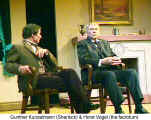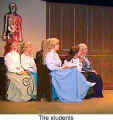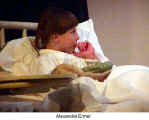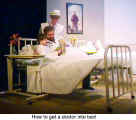
German Theatre Searches for Microbe
 In
the early days of April the Deutsche Theater Toronto presented a thought
provoking comedy by Curt Goetz. Dr. med. Hiob Praetorius is billed as a
story entirely without politics, newly retold from old but good ideas. What
these old ideas were the audience found out in a well-rounded play in 7
scenes in 6 different sets, played by 17 actors. Not an easy project, you
might rightfully say. Yet once again the German Theatre Toronto excelled in
providing excellent entertainment to an audience hungry for, and loyal to,
its labour of love.
In
the early days of April the Deutsche Theater Toronto presented a thought
provoking comedy by Curt Goetz. Dr. med. Hiob Praetorius is billed as a
story entirely without politics, newly retold from old but good ideas. What
these old ideas were the audience found out in a well-rounded play in 7
scenes in 6 different sets, played by 17 actors. Not an easy project, you
might rightfully say. Yet once again the German Theatre Toronto excelled in
providing excellent entertainment to an audience hungry for, and loyal to,
its labour of love.
 Horst
and Sigrid Peter undertook this demanding work knowing that it was risky
business. New recruits for the theatre are hard to come by and the burden of
work falls always on the same shoulders. But so enthusiastic is the core of
this group that they pulled it off again! If anyone knows how to make it go
right, it is this couple. I do not think that it is really clear to the
public just how much work goes into such a production. In this play the
number of necessary props was almost as long as the play itself. There are 6
different settings, which have to be created. Each one of them is very
different. First we meet Dr. Watson with Sherlock Holmes in his study. They
speculate on the cause of Dr. Praetorius’s death. Then we meet the good
doctor in a lecture hall for human anatomy, where he expounds on the subject
of life and death, and how important it is to single out the reason for our
weaknesses in order to create a better world.
Horst
and Sigrid Peter undertook this demanding work knowing that it was risky
business. New recruits for the theatre are hard to come by and the burden of
work falls always on the same shoulders. But so enthusiastic is the core of
this group that they pulled it off again! If anyone knows how to make it go
right, it is this couple. I do not think that it is really clear to the
public just how much work goes into such a production. In this play the
number of necessary props was almost as long as the play itself. There are 6
different settings, which have to be created. Each one of them is very
different. First we meet Dr. Watson with Sherlock Holmes in his study. They
speculate on the cause of Dr. Praetorius’s death. Then we meet the good
doctor in a lecture hall for human anatomy, where he expounds on the subject
of life and death, and how important it is to single out the reason for our
weaknesses in order to create a better world.
![Horst [Dr. Praetorius] & Sigrid Peter [wife and student] (Deutsches Theater Toronto)](005c_DTT-c_small.jpg) His
medical examination office is next. Here he meets a student who thinks that
she is a pregnant, and tries to commit suicide after leaving his office; but
the doctor saves her life. Later on he even marries her.
His
medical examination office is next. Here he meets a student who thinks that
she is a pregnant, and tries to commit suicide after leaving his office; but
the doctor saves her life. Later on he even marries her.
 The
next scene plays in a room of his private clinic. We observe him at his best
bedside manner with 3 patients. With much humour and kindness he manages to
get them to do his bidding.
The
next scene plays in a room of his private clinic. We observe him at his best
bedside manner with 3 patients. With much humour and kindness he manages to
get them to do his bidding.
 The
scene then changes to his home, where he conducts the music he is listening
to. But this is not the only thing he gets to hear. A disciplinary hearing
has been called into his conduct as a doctor. He is not worried at all.
The
scene then changes to his home, where he conducts the music he is listening
to. But this is not the only thing he gets to hear. A disciplinary hearing
has been called into his conduct as a doctor. He is not worried at all.
![Albert Pons [Prof. Nack] with Horst Peter](005c_DTT-f_small.jpg) Next
we face together with the doctor the panel, which is so concerned about his
humanitarian efforts. They are so blind that they make him out to be a
charlatan. We realize that the learned members certainly are not immune to
human stupidity.
Next
we face together with the doctor the panel, which is so concerned about his
humanitarian efforts. They are so blind that they make him out to be a
charlatan. We realize that the learned members certainly are not immune to
human stupidity.
![Horst Peter & Armin Borgers [Prof. Spiter] (Deutsches Theater Toronto)](005c_DTT-g_small.jpg) The
7th and last scene brings us back to Sherlock Holmes, who is
being visited by Shunderson, the doctors loyal friend and servant, who had
just finished telling Holmes the last 5 scenes, and how the doctor met his
death while driving his car into a tree. He was found with a smile on his
face. While Holmes still speculates on the cause of death and suspects foul
play, we finally learn that Praetorius died a happy man. He pondered, as he
often did, why he has not been able to isolate the microbe of human
stupidity, so he can develop a serum against it. Shunderson, who was there
and is the only survivor of this accident, says that his wife whispered
something in his ear. It was the answer to the question Dr. Praetorius has
looked for all his life: "Because you are too stupid!" Thus the
doctor laughs himself ironically to death.
The
7th and last scene brings us back to Sherlock Holmes, who is
being visited by Shunderson, the doctors loyal friend and servant, who had
just finished telling Holmes the last 5 scenes, and how the doctor met his
death while driving his car into a tree. He was found with a smile on his
face. While Holmes still speculates on the cause of death and suspects foul
play, we finally learn that Praetorius died a happy man. He pondered, as he
often did, why he has not been able to isolate the microbe of human
stupidity, so he can develop a serum against it. Shunderson, who was there
and is the only survivor of this accident, says that his wife whispered
something in his ear. It was the answer to the question Dr. Praetorius has
looked for all his life: "Because you are too stupid!" Thus the
doctor laughs himself ironically to death.
There are so many valid points in this play, which reflects our own mistrust of people and also the medical profession and its strange code of ethics, that this play is never out of style. Totally current this fine humour is not loud but makes us think about all our shortcomings.
 Imagine
having to bring this complex work to the stage. Imagine working on a
shoestring budget. Imagine having to play the lead roles, designing the set,
planning the costumes and researching the props needed for the elaborate
production and then getting them. Imagine the tremendous time and effort
that Sigrid and Horst Peter put into this. And that of course is not all. A
technical team has to be found, formed and supervised. The many rehearsals,
getting and keeping every one together is a job in itself. But all these
things were done by Sigrid and Horst Peter! And they have done so for a very
long time. May we suggest an Order of Merit, like so many other contributors
to our German culture in Canada have received?
Imagine
having to bring this complex work to the stage. Imagine working on a
shoestring budget. Imagine having to play the lead roles, designing the set,
planning the costumes and researching the props needed for the elaborate
production and then getting them. Imagine the tremendous time and effort
that Sigrid and Horst Peter put into this. And that of course is not all. A
technical team has to be found, formed and supervised. The many rehearsals,
getting and keeping every one together is a job in itself. But all these
things were done by Sigrid and Horst Peter! And they have done so for a very
long time. May we suggest an Order of Merit, like so many other contributors
to our German culture in Canada have received?
All this of course does not diminish the efforts of all the players and helpers that the theatre group has as members. We should be grateful that some of us still take the time besides busy working schedules to create such a desirable impact on our society. To go home and smile, to have something tangible to think about in a new light is indeed important in our fast moving world. To be entertained and inspired at the same time is what we need. And Deutsche Theater Toronto delivers every year one major production. It is important that we support this endeavour before the existing principals become too old to carry on. They have done it for several decades and could use some new influx.
Horst Peter as Dr. Praetorius delivered his part with fine sensitivity and made us wish that all our doctors were like him. Sigrid as the student and wife proved once again that we couldn’t do without her versatile acting abilities. Her human passion carries over into all her parts.
Horst Vogel as the factotum carries on his fine tradition of reliable performances, and so does Gunther Kunzelmann as Sherlock. Werner Amxeiner’s angry Watson offset Sherlock’s cool calmness well. Monika Lang, who made a comeback to the theatre, played the housekeepers’ role.
Armin Borgers delivered a delightful Professor Spiter. Professor Nack was portrayed by Albert Pons. A newcomer to the group was Alfred Petz as the president of the disciplinary committee. He was well suited for his part.
Besides the parts of the students and other smaller roles there was one part in particular that deserves extra mention. Alexandra Ermel as Jacky brings a freshness to the stage that stands especially in contrast to our more mature players.
Sybille Forster-Rentmeister
Comments to: sfr@echoworld.com
